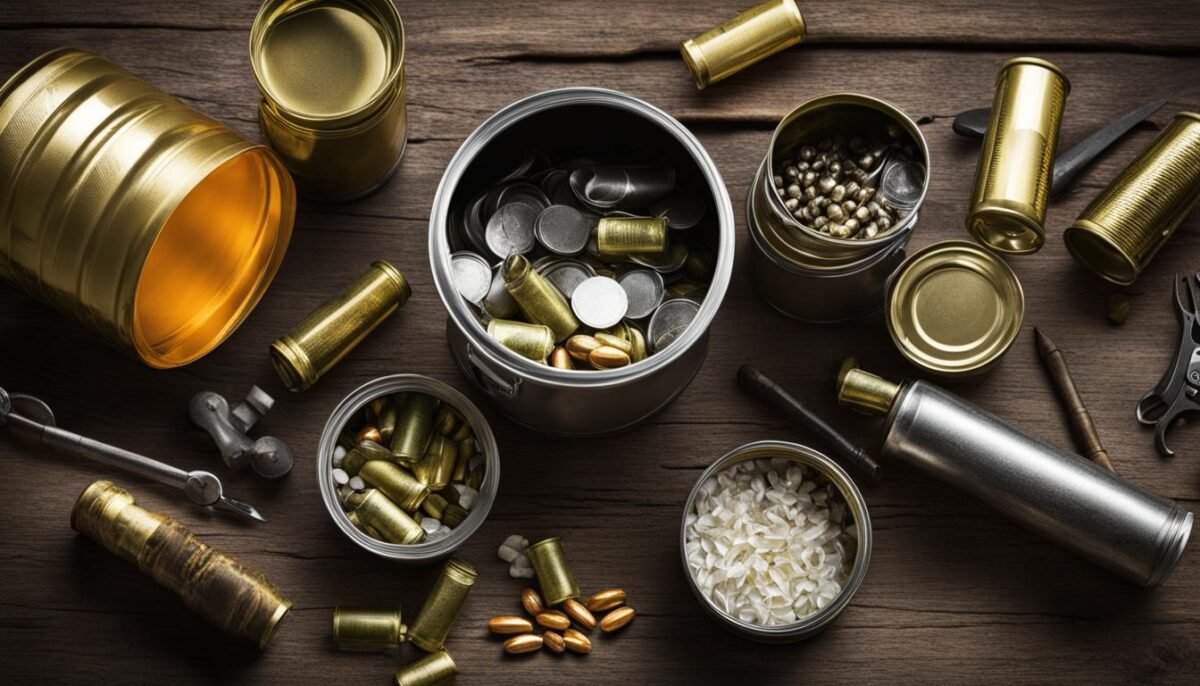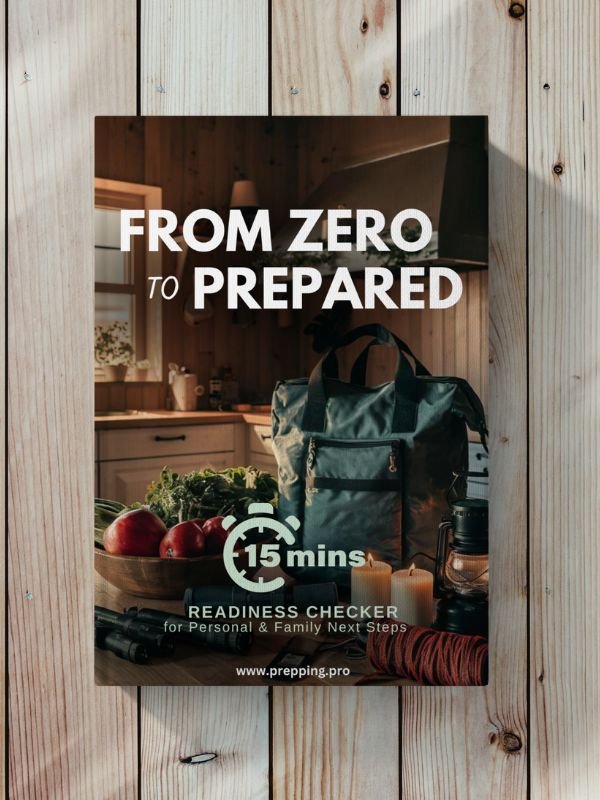As the great Abraham Lincoln once said, “I am a firm believer in the people. If given the truth, they can be depended upon to meet any national crisis. The great point is to bring them the real facts, and beer.”
In this article, we will unpack the top nine proven bartering skills for survival you need to know for survival negotiation tactics.
- Bartering Skills Are Crucial: In a post-collapse scenario, money’s value diminishes, making the ability to barter essential for survival.
- Essentials and Skills Have Value: Items like food, tools, and medical supplies, along with trade skills for survival, are key for trading.
- Diversify Inventory: A varied collection of goods and skills ensures readiness for different needs.
- Focus on Practicality: Everyday needs and skills are more valuable than luxury items or precious metals.
- Negotiation Is Vital: Success in bartering depends on survival negotiation tactics and survivalist barter strategies for trading.
- Safety and Trust Matter: Safe trading practices and building trust within the community are essential.
- Be Adaptable and Prepared: Continuously adjust strategies and prepare for various outcomes.
- Community Cooperation Is Key: Forming networks and alliances enhances survival chances.
Bartering is more than an exchange of goods—it’s a language of survival, of human interaction, and an embodiment of problem-solving.
Table of Contents
Reddit Weighs In: Key Items & Skills Revealed
This case study delves into the perspectives shared by the Reddit prepping community, exploring the best items and skills to have on hand for trading in a post-SHTF (Sh*t Hits The Fan) scenario.

- Objective: By analyzing these discussions, we aim to provide preppers with valuable insights into the most sought-after barter goods and services, enabling them to make informed decisions about their preps and enhancing their chances of thriving in challenging times.
Background Information
- Context: The thread originated on the popular r/preppers subreddit, where a user posed the question, “What are you going to use to barter once SHTF?” This inquiry sparked a lively discussion, garnering hundreds of comments from experienced preppers and enthusiasts alike.
- Community Profile: The r/preppers community consists of individuals dedicated to preparing for various emergencies, disasters, and societal disruptions. With a diverse range of backgrounds and expertise, these preppers offer unique perspectives on survival strategies, including the intricate dynamics of bartering.
Analysis of Discussion
- Key Points: The thread highlighted several recurring themes, with preppers emphasizing the importance of stockpiling vices like alcohol, tobacco, and caffeine, as well as essential items like ammunition, medical supplies, and non-perishable food. Skills were also highly valued, with expertise in areas such as mechanics, construction, healthcare, and agriculture being highly prized.
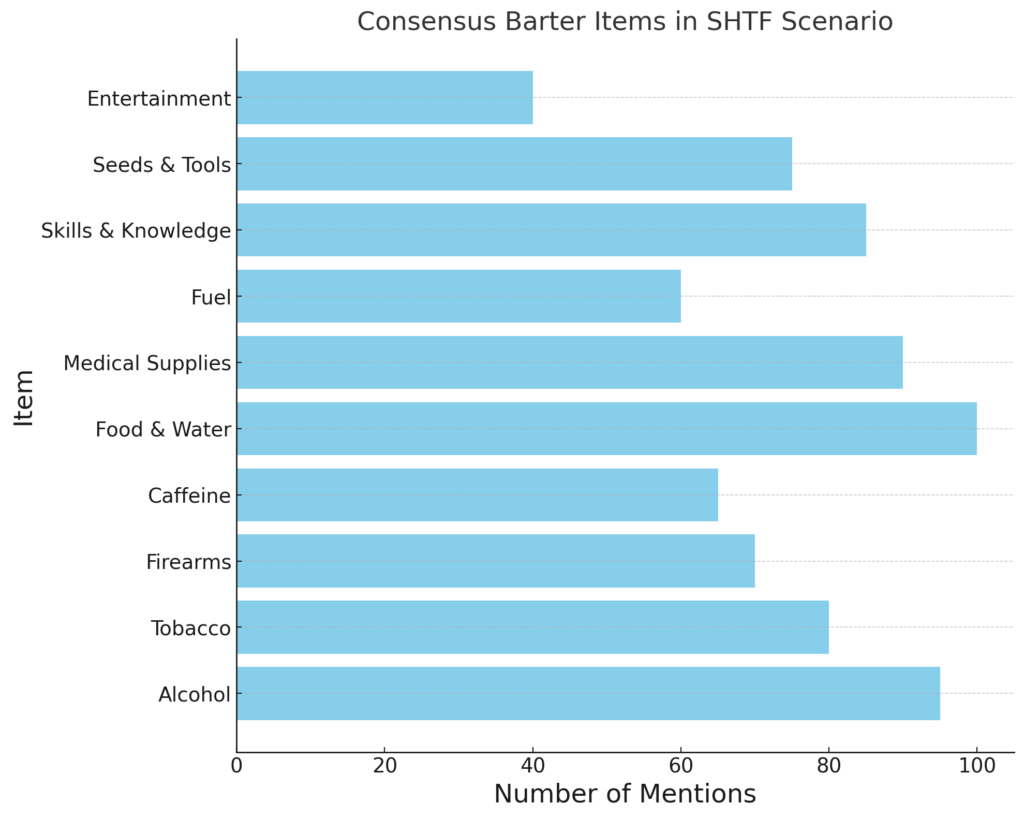
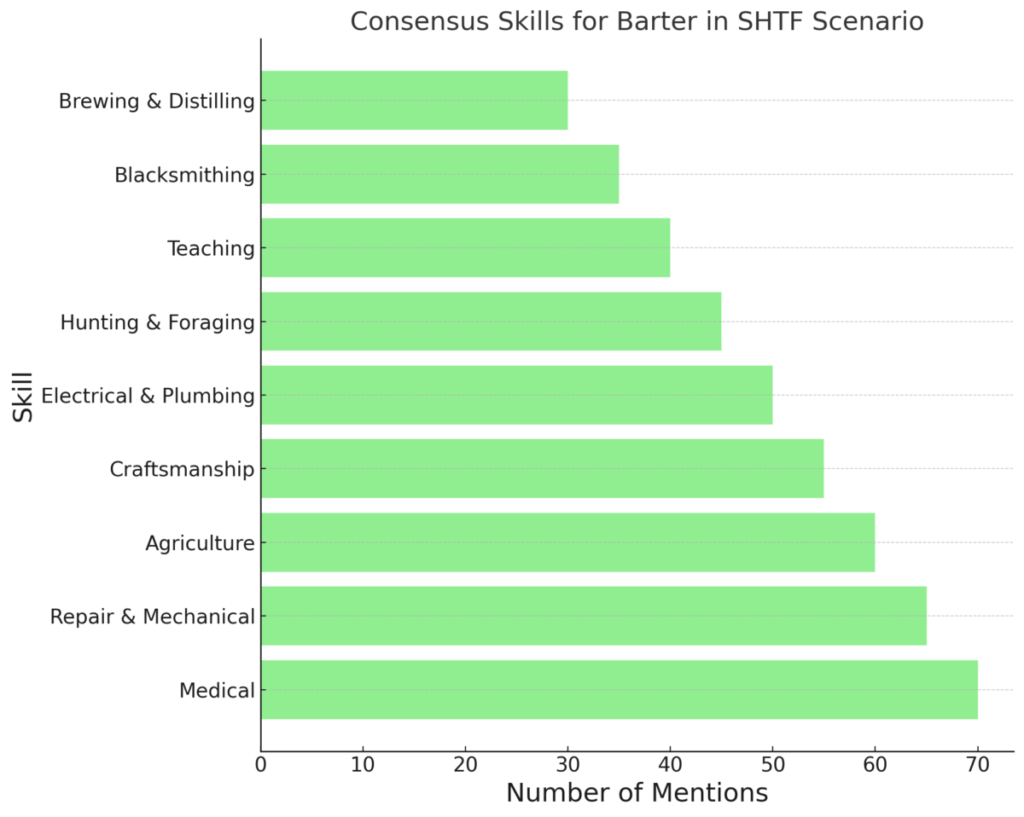
- Insights: Many preppers stressed the significance of having a diverse range of barter items and skills, as different scenarios would necessitate different needs. Additionally, the discussion underscored the potential value of unconventional items like soap, spices, and entertainment (e.g., books, games) in a world where basic necessities are scarce.
Personal Stories or Quotes
- Contributor Highlights: One prepper, u/surfaholic15, shared their experience:
We have been living within [the parallel economy] in multiple states off and on for a long time. Folks with a strong work ethic, wild skill set and trainable generally can get along.
u/surfaholic15
- Differing Views: While some preppers advocated for precious metals like gold and silver as reliable barter currency, others argued that practical skills and consumable goods would hold more value in the immediate aftermath of a societal collapse.
Practical Applications

Based on the insights from the thread, preppers should diversify their stockpiles to include a mix of vices, non-perishable foods, medical supplies, and other essentials.

Additionally, developing practical skills such as gardening, construction, and healthcare can increase one’s bargaining power.

Start small by stockpiling items you already consume (e.g., coffee, alcohol, tobacco) and gradually expand to include other barter-worthy goods.

Simultaneously, invest time in learning and practicing new skills that could be invaluable in a post-SHTF world.
Conclusion
- Summary: The r/preppers community has provided a wealth of insights into the potential barter economy that could emerge in the aftermath of a societal collapse. By stockpiling a diverse range of goods and developing practical skills, preppers can increase their chances of thriving in such challenging times.
- Reflection: While the specifics of what will hold value in a barter-based economy are impossible to predict with certainty, the discussions highlight the importance of adaptability and resourcefulness. Preppers must be willing to think outside the box and leverage their unique skills and resources to navigate the uncertainties of a post-SHTF world.
- Call to Action: I encourage readers to explore the original Reddit thread, engage with the community, and share their own perspectives on bartering strategies. Additionally, start incorporating the recommended items and skills into your prepping plans to enhance your preparedness for potential future scenarios.
References
- Source: /r/preppers
Barter System for Preppers: Preparing Your Inventory
With the threat of a societal collapse, the importance of a well-considered barter system for preppers cannot be overstated. It can mean the difference between life and death in a time where traditional money holds no value. As a survivalist, honing your survival bartering techniques and wilderness bartering techniques will ensure you’re not only prepared for the unique demands of post-collapse transactions but also equipped to sustain yourself and others in critical situations.
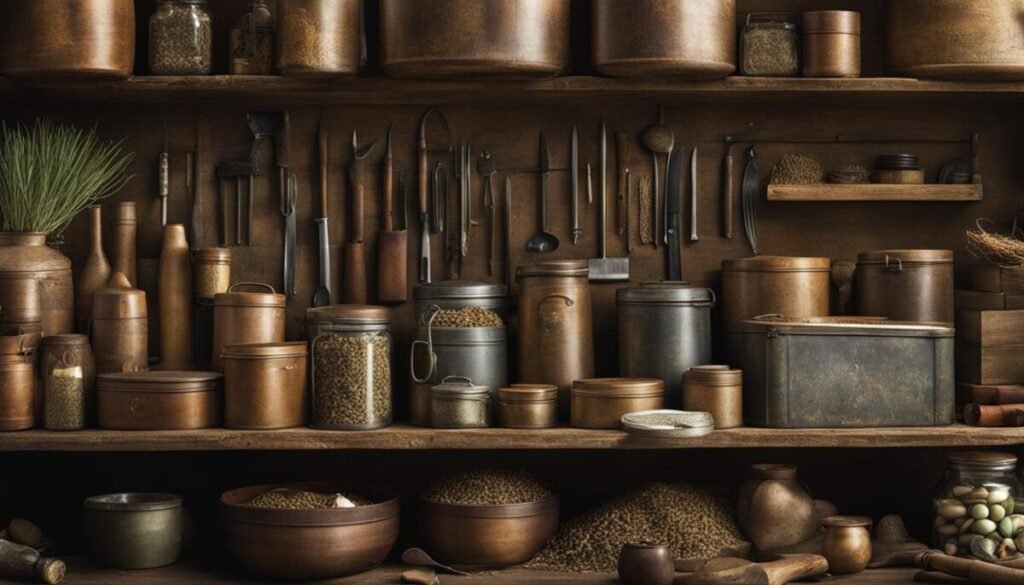
Not only does it involve a careful selection and accumulation of commodities, but it also requires constant anticipation of market needs and changes. This isn’t merely about possession but about prediction – understanding what the society will urgently seek when the customary supply chains fracture.
- Store items with a long shelf life: Commodities that do not perish easily such as canned foods and grains are invaluable additions to a prepper’s inventory.
- Collect multi-purpose items: Products like duct tape, aluminium foil, or a Swiss army knife have multiple uses and will be in high demand.
- Stock up on comfort items: Items like tobacco, alcohol or candies not only fulfill physiological needs but also cater to fundamental human cravings for comfort and familiarity in times of displacement.
- Survival tools: These can range from essential tools such as fire starters, knives, and cordages to sophisticated gear like portable water purifiers and solar-powered devices.
- Medical Supplies: Antibiotics, bandages, painkillers and other such vital medical supplies will be worth their weight in gold after a collapse.
To help structure your inventory, below is a table that categorizes a range of beneficial items:
| Category | Items |
|---|---|
| Food and Water | Canned goods, water purification tablets, dried fruits and vegetables, seeds for planting |
| Medical Supplies | First-aid kits, antibiotic ointments, bandages, painkillers, prescription medicines |
| Survival Tools | Multi-tool, compass, firestarter, fishing line and hooks, duct tape |
| Comfort Items | Alcoholic beverages, tobacco, coffee, chocolates, playing cards |
| Barter Currency | Precious metals like gold and silver |
Remember that being a successful prepper is not just about stocking up. Learning, practicing, and evolving your barter system with consistent relevance to a changing marketplace is at the core of crafting a robust survival strategy. The more comprehensive your understanding and navigation of the bartering world, the higher your chances of durability and resilience in the face of adversity. So, get ready, set, and prepare to barter!
Bartering Skills for Survival: What You Need to Know
In a world where established economic systems have collapsed and the value of traditional currency has faded, your survival could strongly depend on your ability to trade goods and leverage practical skills. The expertise you accumulate over time, such as gardening, woodworking, or medical knowledge, can become invaluable currencies in their own right. The worth of these trade skills for survival is determined by their universal applicability and the depth of your mastery.
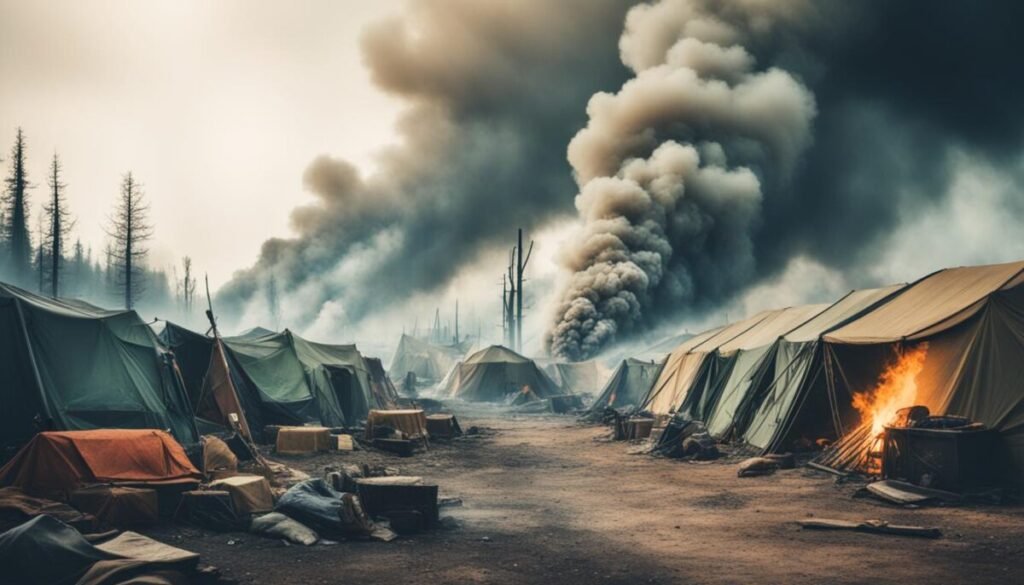
Assessing the Trade Value of Your Skills
As goods could run out or lose relevance, practical skills can endure. They empower you to offer services that are perpetually in-demand, making them a precious commodity in survival bartering. Recognizing the trade value of your skills is an essential bartering skill in itself. It’s about understanding their importance in post-collapse scenarios before these crisis moments occur and preparing accordingly to stay ahead.
Survivalist Barter Strategies: Negotiation and Exchange
Negotiating and exchanging goods and services in survivalist settings demand sharp psychological insight and a reliable strategy. Regardless if you’re trading an item for another or a service for supplies, approaching each transaction with clear objectives and an understanding of leverage becomes crucial. Survival negotiation tactics and survival bartering techniques are heavily dependent on a delicate balance between assertiveness, empathy, practicality and foresight. For instance, occasionally you might need to feign disinterest to drive a hard bargain or audaciously up-sell the value of your offerings. Every negotiation turns into a strategic game of risk and reward.
Nurturing Survival Networks and Alliances
Surviving in a post-collapse world extends beyond hoarding goods. It involves building robust networks and alliances that can optimize resource distribution and offer support in the face of crisis. Trust and reciprocal benefits become the foundation for these structures. Bartering plays a significant role in nurturing these relationships, with each transaction serving as an opportunity to sow seeds of interdependence and cooperation. The interconnectedness of a community not only lends stability but also enhances the survivability of its members, frequently transforming simple economic transactions into lasting partnerships.
Essential Items and Popular Goods in Demand
In the unpredictability of post-collapse scenarios, anticipating the market’s needs and demands becomes a critical aspect of effective bartering. A key part of these essential bartering skills is recognizing which items will hold the most value when traditional forms of currency no longer apply.
A fundamental survival instinct draws people towards certain categories of items, making their demand almost universal in nature. These essential items, necessary for immediate survival and basic comfort, top the list when it comes to trade goods in post-collapse scenarios.
- Clean Water
- Food Supplies
- First Aid Items
Simultaneously, a scarcity of basic amenities leads to a heightened demand for items offering practical functionality and, in some cases, security. These items, while not essential for survival, facilitate daily living and prove invaluable in a post-collapse environment.
- Batteries
- Candles
- Fuel
In addition to fundamental survival items, the allure of commodities catering to human vices and comforts remains strong, even in dire circumstances. Goods such as alcohol and tobacco, while not necessary for survival, hold tremendous bartering power due to their ability to provide psychological relief and a semblance of normalcy amid chaos.
“Bartering in a post-collapse scenario is not just a sterile exchange of items, it’s a human interaction centered around adapting to change, predicting needs, and offering valuable commodities in exchange.”
The art of striking a balance in your inventory, keeping in mind both the essential and popular goods, is a quest for survival wisdom and adaptability. After all, your inventory is your currency in a post-collapse world, and the better your understanding of its value, the more efficient your bartering.
9 Strategies for Effective Bartering
In the realm of bartering skills for survival and trade skills for survival, strategies play an essential role. To navigate a post-collapse world, driven by a barter system for preppers and these survivalist barter strategies, each step will guide you in making effective barter decisions.
1. Know your goods and services value
Grasp the actual and perceived value of your goods and services. This understanding can spell success in negotiations as it allows you to effectively leverage their value to secure favorable terms.
2. Build a network
In the wake of a societal collapse, networks grow vital for survival. A network can provide more extensive access to various goods and services, insights into market demands, and create a support system. Relationships built on mutual benefit and trust lay the cornerstone for long-term survival.
3. Practice negotiation skills
Refined survival negotiation tactics are instrumental in mastering the bartering process. Practicing these skills helps hone your ability to communicate value, understand the other party, and strike mutually beneficial deals. It’s all about maintaining the right balance of assertiveness, flexibility, and the power to innovate solutions even under unconventional constraints.
4. Diversify your offerings
In a bartering environment, diversifying your offerings can be a strategic move. Expanding your repertoire across various categories allows you to meet the varying needs of fellow survivors. This approach reduces reliance on any single commodity, enabling more frequent and diverse exchanges, thus enhancing your survival bartering techniques.
5. Understand needs and wants
Grasping the nuances between needs and wants gives you an upper hand. Needs represent essentials for survival. In contrast, wants, less critical but emotionally potent, can induce trade motivations, especially when they relate to comfort or psychological relief.
6. Stay safe
Safety becomes paramount during transactions in a post-collapse world. The uncertainty and potential for conflict call for precautions, whether that means trading in public spaces, channeling transactions through trusted intermediaries, or setting clear boundaries and terms for an exchange.
7. Use a barter system
Employing a structured barter system can streamline the process of exchanging goods and services. It ensures clear terms are set, the value is agreed upon, and both parties understand the stakes involved in the exchange. It prevents misunderstandings and builds trust.
8. Maintain quality and honesty
Keeping a reputation for providing quality goods and services and maintaining honesty secures your standing as a reliable barter partner. Respecting agreed terms of a trade, and being transparent about your capacities and limitations fosters long-lasting relationships.
9. Prepare for a no-deal outcome
Not every negotiation will end successfully, and it’s important to be prepared for a no-deal outcome. This could mean either walking away from a deal or having backup options to procure valuable goods and services.
Survival Negotiation Tactics: The Art of the Deal
Survival negotiation tactics extend beyond mere transactional exchanges. They delve into the art of the deal. This approach translates to understanding the psychology behind bartering, managing emotions, leveraging scarcity, and crafting deals with lasting value.
Protecting Your Assets: Managing Risks in Barter Transactions
Risk management plays a crucial role in any barter transaction. Protecting your assets involves assessing potential threats and taking steps to mitigate them. It’s critical in enhancing your survivalist barter strategies in a post-collapse world
Building Trust: The Societal Glue in a Post-Collapse World
In a world stripped of traditional monetary systems, trust becomes the societal glue. Building trust in a barter community solidifies your position as a reliable source, fostering mutual relationships, and underlining your relevance as a crucial player in the new societal order.
Understanding the Revived Value of Trade Post-Collapse
Dependence on traditional currency shifted dramatically following societal collapse. Survival now hinges on bartering, the trading of goods and services without involving money, highlighting the renewed importance of honing survival bartering techniques and bartering skills for survival. This shift in economic activity towards tangible assets and historical bartering systems pave the way for preppers and survivors to navigate in a post-collapse world.
The Necessity of Bartering Skills for Survival
When established economic systems crumble, the importance of trade skills for survival ascends. These skills facilitate access to life-sustaining goods and services, vital in remaining resilient in face of adversity. Specifically, the barter system for preppers becomes a survival lynchpin, given currency loss of value, and even spreading into non-existence.
The Shift from Currency to Tangible Assets
Post-collapse scenarios inevitably lead to a paradigm shift – from colonial reliance on currency to a newfound era of tangible assets. Now, value is subjectively perceived with respect to utility, scarcity, and demand of commodities. Commodities become the small hinges that swing big economic doors, providing tangible support amidst unstable economies. To survive, one must willingly adapt and master this new reality, where trade goods in post-collapse scenarios become essential.
Historical Precedence: Barter Systems in Economic Crises
History vibrantly echoes instances of societal reliance on bartering during economic crises. Whether through currencies falling or established trade networks getting disrupted, human societies have routinely resorted to historical bartering systems. These historical precedents serve as insightful tutors, enabling preppers to adapt and be prepared for potential patterns, strategies, and systems that may find relevance in a post-collapse world.
“
Conclusion
In an age where the stability of established economic systems is increasingly uncertain, the mastery of bartering skills for survival could make the difference between mere existence and thriving post-collapse. The principles of preparedness, the fortitude to build and maintain networks, and the execution of principled negotiation tactics all come into play, equipping survivalists to face an uncertain future with confidence.
These essential skills are about far more than just negotiating survival. They paving the way to rebuild communities and establish new societal structures underpinned by cooperation and mutual support. One could argue that in many ways, the re-emergence of bartering speaks to the resilience and adaptability of the human spirit.
In post-collapse environments, bartering will become the essence of economic transactions. But its true value lies beneath the surface—bartering has the potential to weave a strong social fabric amidst chaos, fostering a unified, resilient, and thriving society. As we embrace the knowledge of trade skills for survival, we equip ourselves to shape a new order, where survival springs not from individual competition, but collective cooperation.

